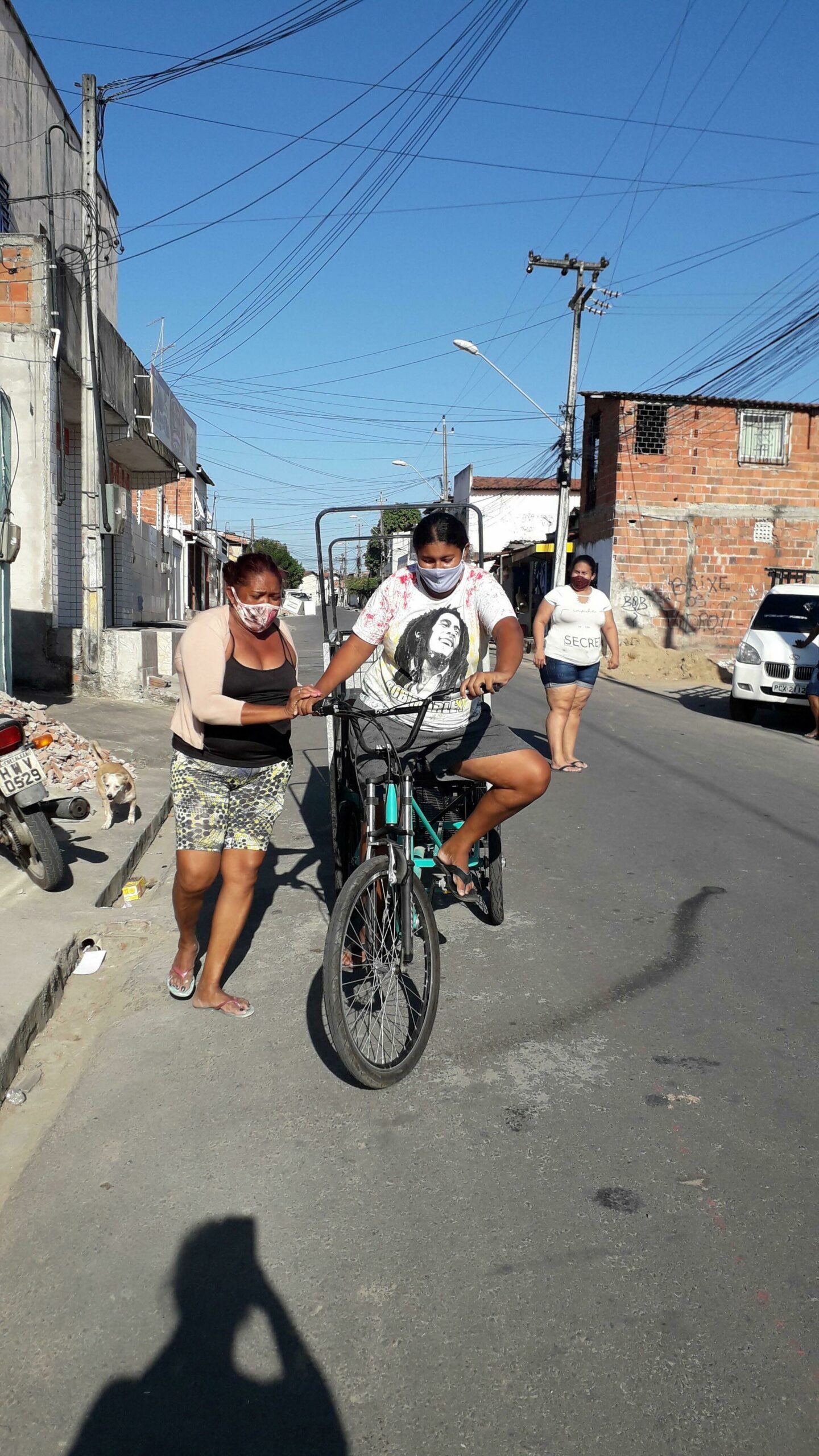By Adriana Marmo
Antônia Carliane Sousa de Araújo, 29, has been a waste picker since she was a teenager. At 17, she switched from being a domestic worker to a job that would give her more respect, freedom of schedule and the necessary income to eat and live. Carliane, as well as nearly 1 million other waste pickers in Brazil, according to estimates by the National Movement of Collectors, are an essential part in the recycling chain: they are responsible for the collection of 90% of everything that is recycled in the country.
The work of these professionals consists of walking through the streets of the cities collecting materials such as cardboard, glass, PET bottles, aluminium cans and several other types of waste that can be reused in homes and shops. As domestic waste separation is not yet widely practiced in the country, the pickers usually open the residual waste bags right before the official collecting vehicle passes by, to search for waste that can be commercialized.
The collected load is usually stowed in carts – in the state of Ceará these carts are mostly made from the scrap of old refrigerators which can carry up to 200 kilos. The pickers pull these carts while they travel dozens of kilometres every day, competing for space on the streets with cars, buses, trucks and motorbikes.
The waste pickers are also environmental agents, as they educate the population in informal conversations about the importance of cleaning-up and segregating the waste to be collected and how to dispose materials correctly. “People know almost nothing about waste separation. We walk on the streets teaching people about it”, says Carliane. But waste pickers are still a very marginalised group and they work in precarious conditions with very low payment. According to the Institute of Applied Economic Research (IPEA) the average monthly income of a waste picker in Brazil is R$561.93 (US$107,31) – only half of the country´s minimum wage of R$1,110 (US$212,00).
In January 2021, together with 24 professionals, Carliane started riding an electric tricycle instead of continuing pulling her cart through the streets. The exchange of vehicles is the main action of the Re-ciclo project: donating electric tricycles to the waste picker associations in the city of Fortaleza, capital of Ceará. The project “Re-ciclo”, resulted from a TUMI Challenge and is being implemented by the Municipality of Fortaleza with the support of CAF and GIZ. Re-ciclo has three objectives: Improving the waste pickers quality of life, increasing the waste collection in the city and testing tricycles in the context of urban logistics.
The impact of tricycles on waste pickers’ lives
According to Carliane, a major impact on her everyday life, using the tricycle, is physical. “At the end of the day I no longer feel pain in my legs and my back. I get home and I don’t have that tiredness I used to have anymore,” she says- She also started to make more trips per day since using the tricycle. “Sometimes I can do up to three trips in one day.”
The pandemic has affected waste collection in several ways. Not only has the volume of recycling material gone down, the number of waste pickers, in the face of unemployment, has also increased. “I am glad that with the tricycle I can reach areas further away with less competition.”
Carliane also feels like benefitting from more traffic safety, because she can use the city’s cycle lanes on some parts of her route now. The capital of Ceará has been encouraging the use of bicycles as a means of transport. Since 2013 the city increased its’ cycling infrastructure by 464%, providing now 384 km of cycle routes and lanes. According to the Institute for Transport and Development Policy (ITDP) of Brazil, Fortaleza is the city in which people live closest to cycling infrastructure – with more than 50% of the residents living in a 300 meters – radius of a cycle route or lane.
“Most of my rides are still on streets and trails next to cars. The tricycle imposes more respect than the cart, but even so, there are still drivers who honk their horns, telling me to get out of the way,” she says. “When I get on a bicycle lane, it’s all joy! I relax, have fun and enjoy the wind blowing in my face.”
The tricycle, according to Carliane, has brought another big change. She now feels recognized and respected in her work. “Before, people used to run away from me on the street. Now they stop and take selfies!” she laughs. “And many people also ask me to stop, so they can go into their house to come back with bags full of donations.”
The tricycle attracts the attention on the street and wherever it goes, it catches many eyes and sympathy of people who finally start noticing the waste pickers riding it. Usually, the waste pickers are stigmatized as being thieves, dirty, drug addicts and, most of the time, are invisible in the eyes of the population. “I was used to it and didn’t even care about it, but now that I can feel the difference, I think it’s great.”
In addition to her new tricycles, Carliane took also part in a series of training sessions given by Re-ciclo. Besides workshops on vehicle adaption and road safety, she had sessions on basic mechanics for the maintenance of the tricycle. Soon, there will be trainings on health and safety at work as well as door-to-door campaigns in the region.
The project is still in the phase of gathering data to find out the impact that the usage of tricycles has had onto the waste collection and, consequently, on Carliane’s income. Carliane has already approved the change: “Waste picking has become easier and I feel more respected!”


